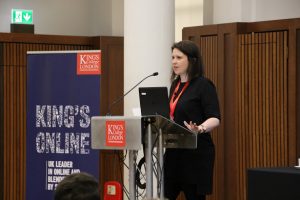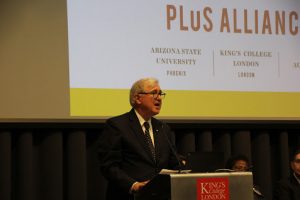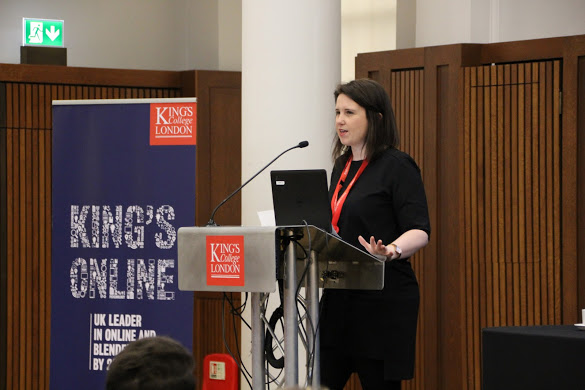
On Monday 24th April, King’s College London hosted the inaugural King’s Online conference – Unlocking the Future of Higher Education. Anna Wood, Director of King’s Online, opened the event by questioning why Higher Education had been slow to embrace the opportunities offered by technology. She suggested that it was due to lack of investment in IT and educational technology capabilities as well as a reliance on the traditional lecture seminar model. She indicated that students in the UK are more aware that their learning environment could be different as a result of increased use of technology in schools. Anna provided an overview of how King’s were looking to change things through the King’s Online initiative. King’s Online is just over a year old and is the online branch of King’s College London, providing Masters programmes in conjunction with Pearson and MOOCs in conjunction with FutureLearn. The importance of partnership was emphasised both in Anna’s presentation and throughout the day.
Professor Evelyn Welch, Provost and Senior Vice-President (Arts and Sciences) at King’s College London, presented the background behind the King’s strategy in light of how a traditional university was embracing online learning. In a bold statement, she stated that the aim was for King’s to be the UK leader in online and blended delivery by 2029 and the hope that King’s Online will transform traditional teaching and King’s itself. A key focus is on “extending reach and expanding access” through innovative online education. She highlighted the work of the Sanctuary programme as a collective response for establishing new ways for refugees to access Higher Education, in particular the Partnership for Digital Learning and Increased Access (PADILEIA) project to produce 12 MOOCs targeted at refugee communities.
Partnering with Pearson
Duncan Smith, Business Manager for King’s Online, introduced the Pearson/King’s partnership, which started in September 2015 with an commitment to develop 10 Masters programmes, four of which have now been launched. The partnership is based on a business model that supports innovation and removes risk for academic staff through the use of pump-prime funding, e.g. additional payments to module leaders or used to support teaching buy-in. Pearson’s role in the partnership is marketing, recruitment and lead generation, and student support, whilst King’s is responsible for the design and development of courses. The initial intention was to target programmes that would scale quickly, with at least 100 enrolments per year, and these enrolment goals were agreed with Pearson based on their market analysis. The next challenge is how to deal with the more niche markets.
Looking to the future
Professor Ian Jacobs, President and VC at the University of New South Wales, described what education could look like beyond 2025 and suggested that degrees would become more personalised in terms of location and time, with a mixing of online and on-campus experiences. For example, a student could choose modules at different universities as well as online. This would require us to rethink the nature of campus life, especially if campuses could be used by upwards of 1 million students in short 1-4 week bursts of intensive, high value, face to face interactions to supplement the digital offerings. Through the use of cutting edge technology, he suggested that a small group of universities would emerge who could deliver education of the highest quality, globally and at scale. To do this it would be necessary to form partnerships that would span the globe and enable institutions to be at the forefront of change.

Building on this, Professor Edward Byrne, President and Principal of King’s College London, closed the event by suggesting there were two models for universities who want to expand their global reach:
- Do it yourself model – establish campuses around the world, with intellectual power coming from the ‘mothership’
- Join an alliance – such as the PLuS Alliance between King’s College London, Arizona State University and the University of New South Wales, Australia. He suggested that this is more powerful than a single dominant model and that the alliance would select which things they would do together.
So the take home message for institutions looking to expand their global educational reach was to look for and develop partnerships with other institutions and commercial providers in order to survive in this new era of learning and teaching.
For a more detailed report on the day, please see the King’s Online conference report.
Photos courtesy of King’s Online, King’s College London.

